Individual Assignment 3: Leadership Theories, Motivation and Films
VerifiedAdded on 2020/03/16
|6
|1712
|52
Discussion Board Post
AI Summary
This individual assignment presents a comprehensive discussion on leadership theories, employee motivation, delegation, and teamwork. It begins by differentiating between trait and behavioral leadership theories, highlighting the factors organizations consider when selecting and developing leaders, emphasizing the importance of skills and behaviors. The assignment then explores employee motivation strategies, focusing on factors like employee engagement, rewards, and empowerment. It incorporates a film analysis, drawing parallels between Auguste Comte's societal stages and the film 'The Gods Must be Crazy'. The assignment further delves into delegation strategies, outlining essential considerations for effective delegation and tasks that executives cannot delegate. Finally, it examines the characteristics of successful teamwork, including team size, member skills, and the importance of cooperation and flexibility. References are provided at the end.
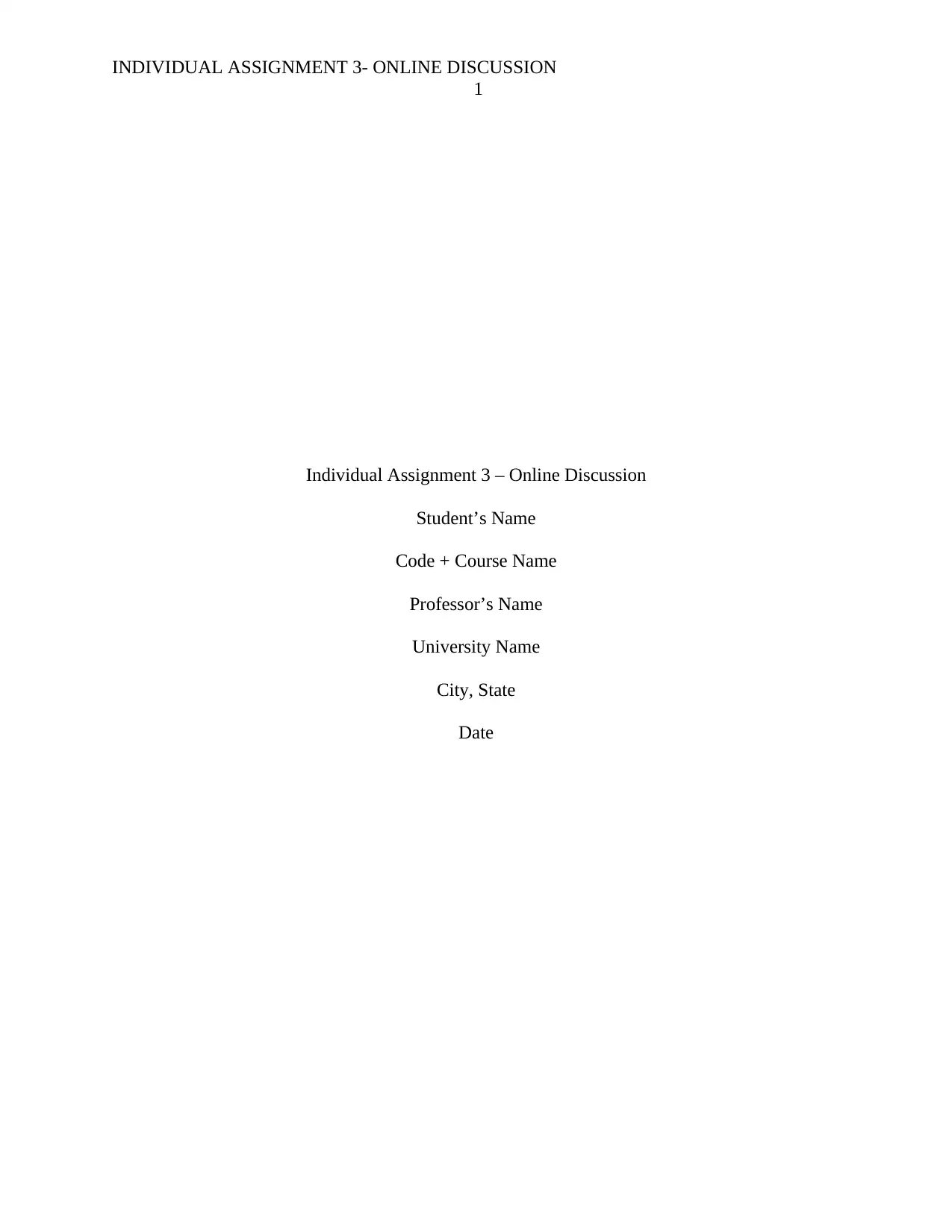
INDIVIDUAL ASSIGNMENT 3- ONLINE DISCUSSION
1
Individual Assignment 3 – Online Discussion
Student’s Name
Code + Course Name
Professor’s Name
University Name
City, State
Date
1
Individual Assignment 3 – Online Discussion
Student’s Name
Code + Course Name
Professor’s Name
University Name
City, State
Date
Paraphrase This Document
Need a fresh take? Get an instant paraphrase of this document with our AI Paraphraser
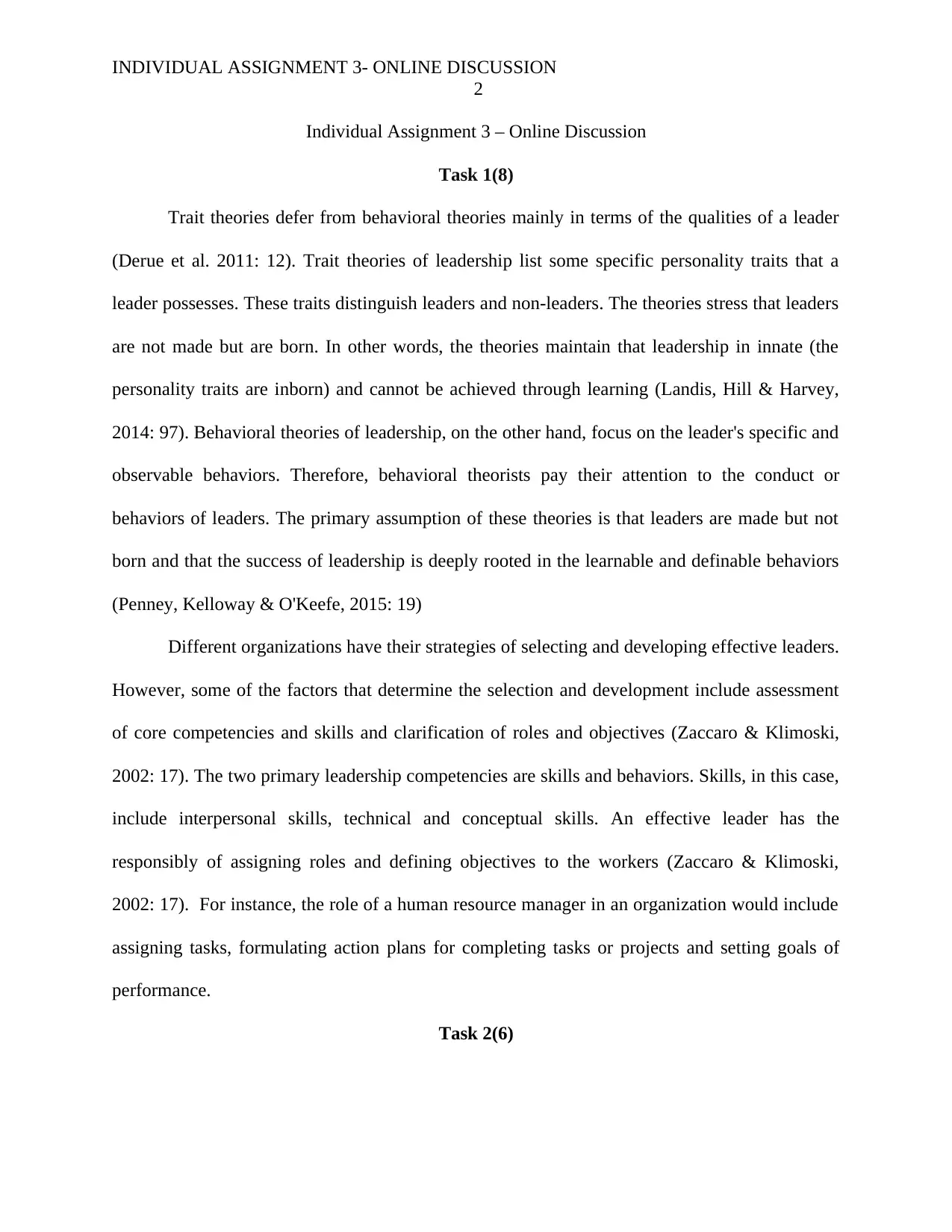
INDIVIDUAL ASSIGNMENT 3- ONLINE DISCUSSION
2
Individual Assignment 3 – Online Discussion
Task 1(8)
Trait theories defer from behavioral theories mainly in terms of the qualities of a leader
(Derue et al. 2011: 12). Trait theories of leadership list some specific personality traits that a
leader possesses. These traits distinguish leaders and non-leaders. The theories stress that leaders
are not made but are born. In other words, the theories maintain that leadership in innate (the
personality traits are inborn) and cannot be achieved through learning (Landis, Hill & Harvey,
2014: 97). Behavioral theories of leadership, on the other hand, focus on the leader's specific and
observable behaviors. Therefore, behavioral theorists pay their attention to the conduct or
behaviors of leaders. The primary assumption of these theories is that leaders are made but not
born and that the success of leadership is deeply rooted in the learnable and definable behaviors
(Penney, Kelloway & O'Keefe, 2015: 19)
Different organizations have their strategies of selecting and developing effective leaders.
However, some of the factors that determine the selection and development include assessment
of core competencies and skills and clarification of roles and objectives (Zaccaro & Klimoski,
2002: 17). The two primary leadership competencies are skills and behaviors. Skills, in this case,
include interpersonal skills, technical and conceptual skills. An effective leader has the
responsibly of assigning roles and defining objectives to the workers (Zaccaro & Klimoski,
2002: 17). For instance, the role of a human resource manager in an organization would include
assigning tasks, formulating action plans for completing tasks or projects and setting goals of
performance.
Task 2(6)
2
Individual Assignment 3 – Online Discussion
Task 1(8)
Trait theories defer from behavioral theories mainly in terms of the qualities of a leader
(Derue et al. 2011: 12). Trait theories of leadership list some specific personality traits that a
leader possesses. These traits distinguish leaders and non-leaders. The theories stress that leaders
are not made but are born. In other words, the theories maintain that leadership in innate (the
personality traits are inborn) and cannot be achieved through learning (Landis, Hill & Harvey,
2014: 97). Behavioral theories of leadership, on the other hand, focus on the leader's specific and
observable behaviors. Therefore, behavioral theorists pay their attention to the conduct or
behaviors of leaders. The primary assumption of these theories is that leaders are made but not
born and that the success of leadership is deeply rooted in the learnable and definable behaviors
(Penney, Kelloway & O'Keefe, 2015: 19)
Different organizations have their strategies of selecting and developing effective leaders.
However, some of the factors that determine the selection and development include assessment
of core competencies and skills and clarification of roles and objectives (Zaccaro & Klimoski,
2002: 17). The two primary leadership competencies are skills and behaviors. Skills, in this case,
include interpersonal skills, technical and conceptual skills. An effective leader has the
responsibly of assigning roles and defining objectives to the workers (Zaccaro & Klimoski,
2002: 17). For instance, the role of a human resource manager in an organization would include
assigning tasks, formulating action plans for completing tasks or projects and setting goals of
performance.
Task 2(6)
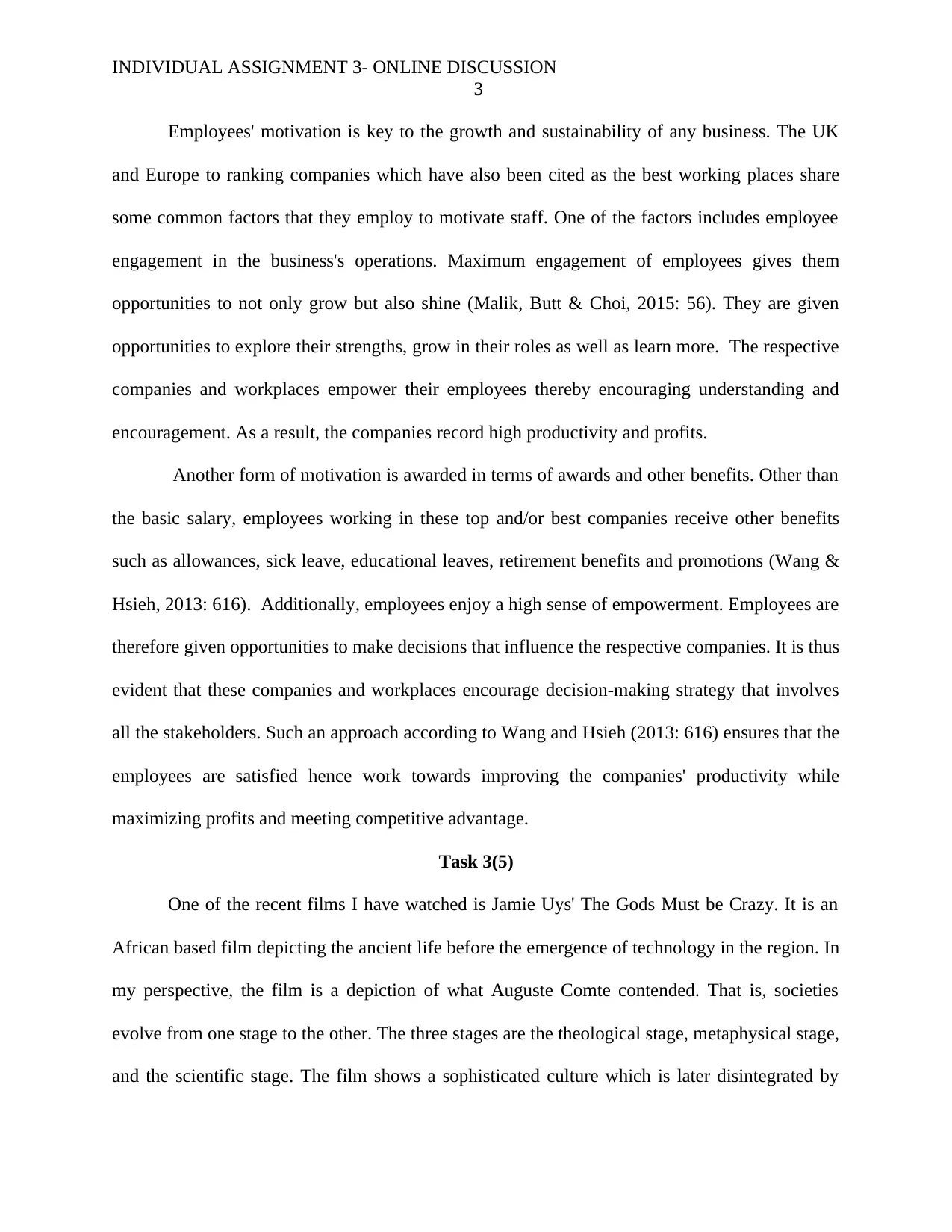
INDIVIDUAL ASSIGNMENT 3- ONLINE DISCUSSION
3
Employees' motivation is key to the growth and sustainability of any business. The UK
and Europe to ranking companies which have also been cited as the best working places share
some common factors that they employ to motivate staff. One of the factors includes employee
engagement in the business's operations. Maximum engagement of employees gives them
opportunities to not only grow but also shine (Malik, Butt & Choi, 2015: 56). They are given
opportunities to explore their strengths, grow in their roles as well as learn more. The respective
companies and workplaces empower their employees thereby encouraging understanding and
encouragement. As a result, the companies record high productivity and profits.
Another form of motivation is awarded in terms of awards and other benefits. Other than
the basic salary, employees working in these top and/or best companies receive other benefits
such as allowances, sick leave, educational leaves, retirement benefits and promotions (Wang &
Hsieh, 2013: 616). Additionally, employees enjoy a high sense of empowerment. Employees are
therefore given opportunities to make decisions that influence the respective companies. It is thus
evident that these companies and workplaces encourage decision-making strategy that involves
all the stakeholders. Such an approach according to Wang and Hsieh (2013: 616) ensures that the
employees are satisfied hence work towards improving the companies' productivity while
maximizing profits and meeting competitive advantage.
Task 3(5)
One of the recent films I have watched is Jamie Uys' The Gods Must be Crazy. It is an
African based film depicting the ancient life before the emergence of technology in the region. In
my perspective, the film is a depiction of what Auguste Comte contended. That is, societies
evolve from one stage to the other. The three stages are the theological stage, metaphysical stage,
and the scientific stage. The film shows a sophisticated culture which is later disintegrated by
3
Employees' motivation is key to the growth and sustainability of any business. The UK
and Europe to ranking companies which have also been cited as the best working places share
some common factors that they employ to motivate staff. One of the factors includes employee
engagement in the business's operations. Maximum engagement of employees gives them
opportunities to not only grow but also shine (Malik, Butt & Choi, 2015: 56). They are given
opportunities to explore their strengths, grow in their roles as well as learn more. The respective
companies and workplaces empower their employees thereby encouraging understanding and
encouragement. As a result, the companies record high productivity and profits.
Another form of motivation is awarded in terms of awards and other benefits. Other than
the basic salary, employees working in these top and/or best companies receive other benefits
such as allowances, sick leave, educational leaves, retirement benefits and promotions (Wang &
Hsieh, 2013: 616). Additionally, employees enjoy a high sense of empowerment. Employees are
therefore given opportunities to make decisions that influence the respective companies. It is thus
evident that these companies and workplaces encourage decision-making strategy that involves
all the stakeholders. Such an approach according to Wang and Hsieh (2013: 616) ensures that the
employees are satisfied hence work towards improving the companies' productivity while
maximizing profits and meeting competitive advantage.
Task 3(5)
One of the recent films I have watched is Jamie Uys' The Gods Must be Crazy. It is an
African based film depicting the ancient life before the emergence of technology in the region. In
my perspective, the film is a depiction of what Auguste Comte contended. That is, societies
evolve from one stage to the other. The three stages are the theological stage, metaphysical stage,
and the scientific stage. The film shows a sophisticated culture which is later disintegrated by
⊘ This is a preview!⊘
Do you want full access?
Subscribe today to unlock all pages.

Trusted by 1+ million students worldwide
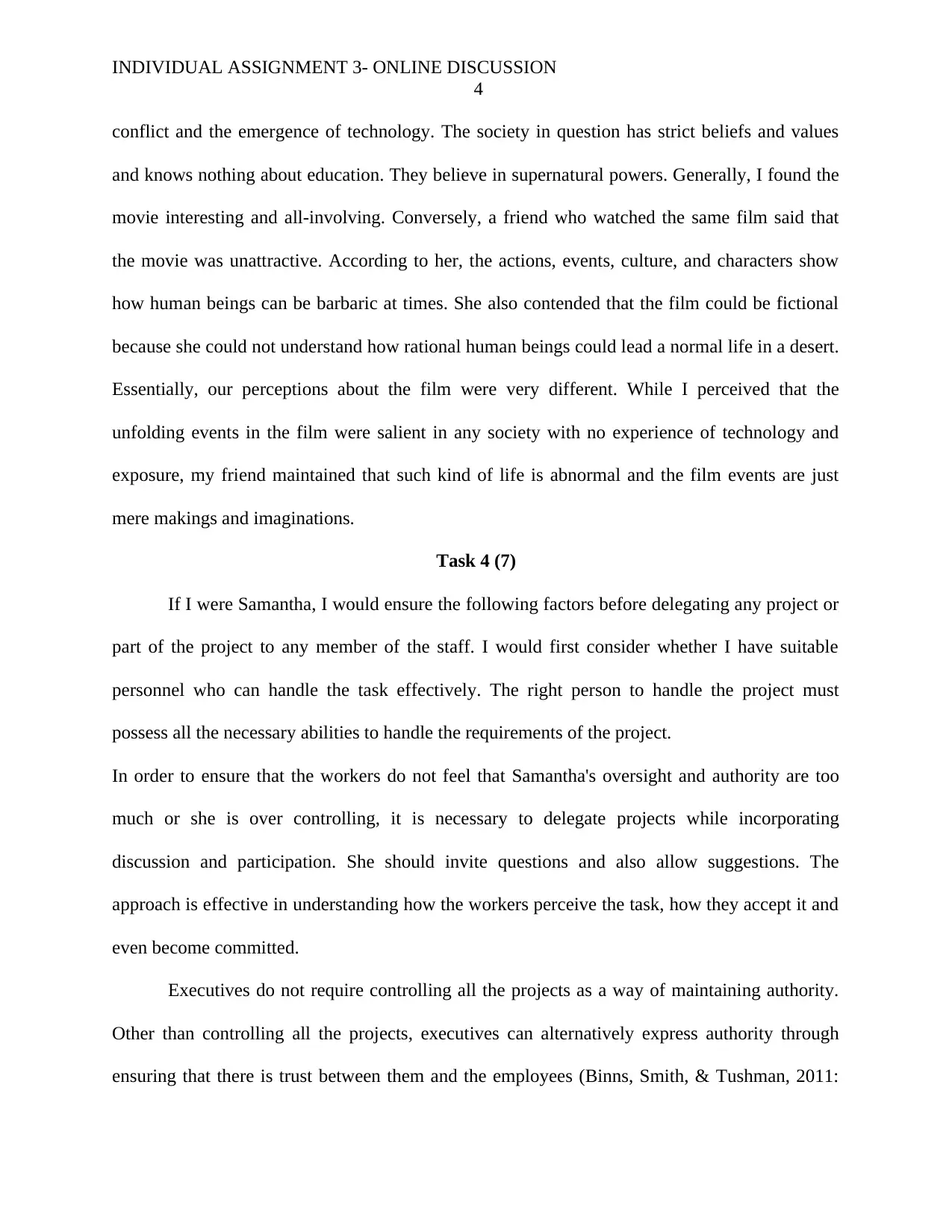
INDIVIDUAL ASSIGNMENT 3- ONLINE DISCUSSION
4
conflict and the emergence of technology. The society in question has strict beliefs and values
and knows nothing about education. They believe in supernatural powers. Generally, I found the
movie interesting and all-involving. Conversely, a friend who watched the same film said that
the movie was unattractive. According to her, the actions, events, culture, and characters show
how human beings can be barbaric at times. She also contended that the film could be fictional
because she could not understand how rational human beings could lead a normal life in a desert.
Essentially, our perceptions about the film were very different. While I perceived that the
unfolding events in the film were salient in any society with no experience of technology and
exposure, my friend maintained that such kind of life is abnormal and the film events are just
mere makings and imaginations.
Task 4 (7)
If I were Samantha, I would ensure the following factors before delegating any project or
part of the project to any member of the staff. I would first consider whether I have suitable
personnel who can handle the task effectively. The right person to handle the project must
possess all the necessary abilities to handle the requirements of the project.
In order to ensure that the workers do not feel that Samantha's oversight and authority are too
much or she is over controlling, it is necessary to delegate projects while incorporating
discussion and participation. She should invite questions and also allow suggestions. The
approach is effective in understanding how the workers perceive the task, how they accept it and
even become committed.
Executives do not require controlling all the projects as a way of maintaining authority.
Other than controlling all the projects, executives can alternatively express authority through
ensuring that there is trust between them and the employees (Binns, Smith, & Tushman, 2011:
4
conflict and the emergence of technology. The society in question has strict beliefs and values
and knows nothing about education. They believe in supernatural powers. Generally, I found the
movie interesting and all-involving. Conversely, a friend who watched the same film said that
the movie was unattractive. According to her, the actions, events, culture, and characters show
how human beings can be barbaric at times. She also contended that the film could be fictional
because she could not understand how rational human beings could lead a normal life in a desert.
Essentially, our perceptions about the film were very different. While I perceived that the
unfolding events in the film were salient in any society with no experience of technology and
exposure, my friend maintained that such kind of life is abnormal and the film events are just
mere makings and imaginations.
Task 4 (7)
If I were Samantha, I would ensure the following factors before delegating any project or
part of the project to any member of the staff. I would first consider whether I have suitable
personnel who can handle the task effectively. The right person to handle the project must
possess all the necessary abilities to handle the requirements of the project.
In order to ensure that the workers do not feel that Samantha's oversight and authority are too
much or she is over controlling, it is necessary to delegate projects while incorporating
discussion and participation. She should invite questions and also allow suggestions. The
approach is effective in understanding how the workers perceive the task, how they accept it and
even become committed.
Executives do not require controlling all the projects as a way of maintaining authority.
Other than controlling all the projects, executives can alternatively express authority through
ensuring that there is trust between them and the employees (Binns, Smith, & Tushman, 2011:
Paraphrase This Document
Need a fresh take? Get an instant paraphrase of this document with our AI Paraphraser
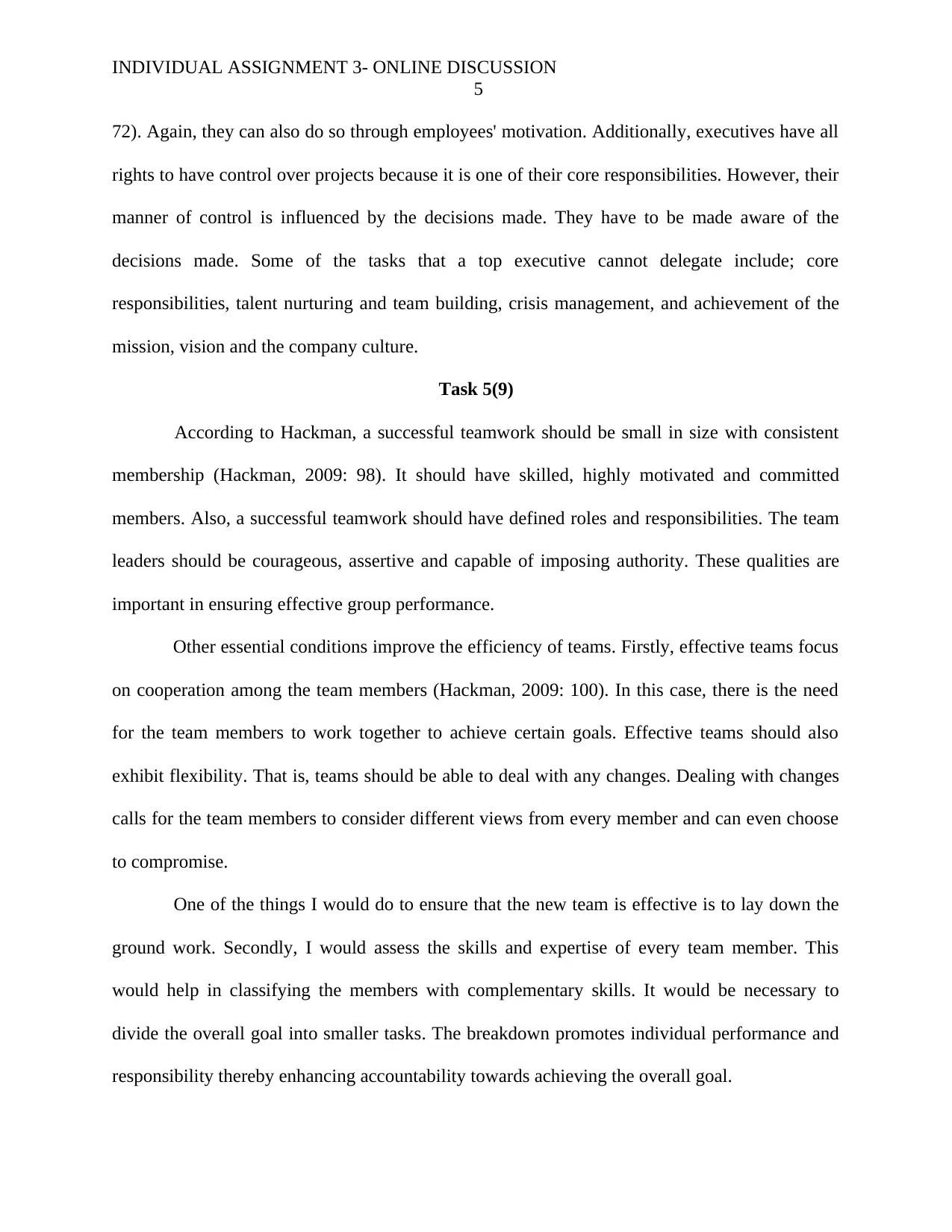
INDIVIDUAL ASSIGNMENT 3- ONLINE DISCUSSION
5
72). Again, they can also do so through employees' motivation. Additionally, executives have all
rights to have control over projects because it is one of their core responsibilities. However, their
manner of control is influenced by the decisions made. They have to be made aware of the
decisions made. Some of the tasks that a top executive cannot delegate include; core
responsibilities, talent nurturing and team building, crisis management, and achievement of the
mission, vision and the company culture.
Task 5(9)
According to Hackman, a successful teamwork should be small in size with consistent
membership (Hackman, 2009: 98). It should have skilled, highly motivated and committed
members. Also, a successful teamwork should have defined roles and responsibilities. The team
leaders should be courageous, assertive and capable of imposing authority. These qualities are
important in ensuring effective group performance.
Other essential conditions improve the efficiency of teams. Firstly, effective teams focus
on cooperation among the team members (Hackman, 2009: 100). In this case, there is the need
for the team members to work together to achieve certain goals. Effective teams should also
exhibit flexibility. That is, teams should be able to deal with any changes. Dealing with changes
calls for the team members to consider different views from every member and can even choose
to compromise.
One of the things I would do to ensure that the new team is effective is to lay down the
ground work. Secondly, I would assess the skills and expertise of every team member. This
would help in classifying the members with complementary skills. It would be necessary to
divide the overall goal into smaller tasks. The breakdown promotes individual performance and
responsibility thereby enhancing accountability towards achieving the overall goal.
5
72). Again, they can also do so through employees' motivation. Additionally, executives have all
rights to have control over projects because it is one of their core responsibilities. However, their
manner of control is influenced by the decisions made. They have to be made aware of the
decisions made. Some of the tasks that a top executive cannot delegate include; core
responsibilities, talent nurturing and team building, crisis management, and achievement of the
mission, vision and the company culture.
Task 5(9)
According to Hackman, a successful teamwork should be small in size with consistent
membership (Hackman, 2009: 98). It should have skilled, highly motivated and committed
members. Also, a successful teamwork should have defined roles and responsibilities. The team
leaders should be courageous, assertive and capable of imposing authority. These qualities are
important in ensuring effective group performance.
Other essential conditions improve the efficiency of teams. Firstly, effective teams focus
on cooperation among the team members (Hackman, 2009: 100). In this case, there is the need
for the team members to work together to achieve certain goals. Effective teams should also
exhibit flexibility. That is, teams should be able to deal with any changes. Dealing with changes
calls for the team members to consider different views from every member and can even choose
to compromise.
One of the things I would do to ensure that the new team is effective is to lay down the
ground work. Secondly, I would assess the skills and expertise of every team member. This
would help in classifying the members with complementary skills. It would be necessary to
divide the overall goal into smaller tasks. The breakdown promotes individual performance and
responsibility thereby enhancing accountability towards achieving the overall goal.
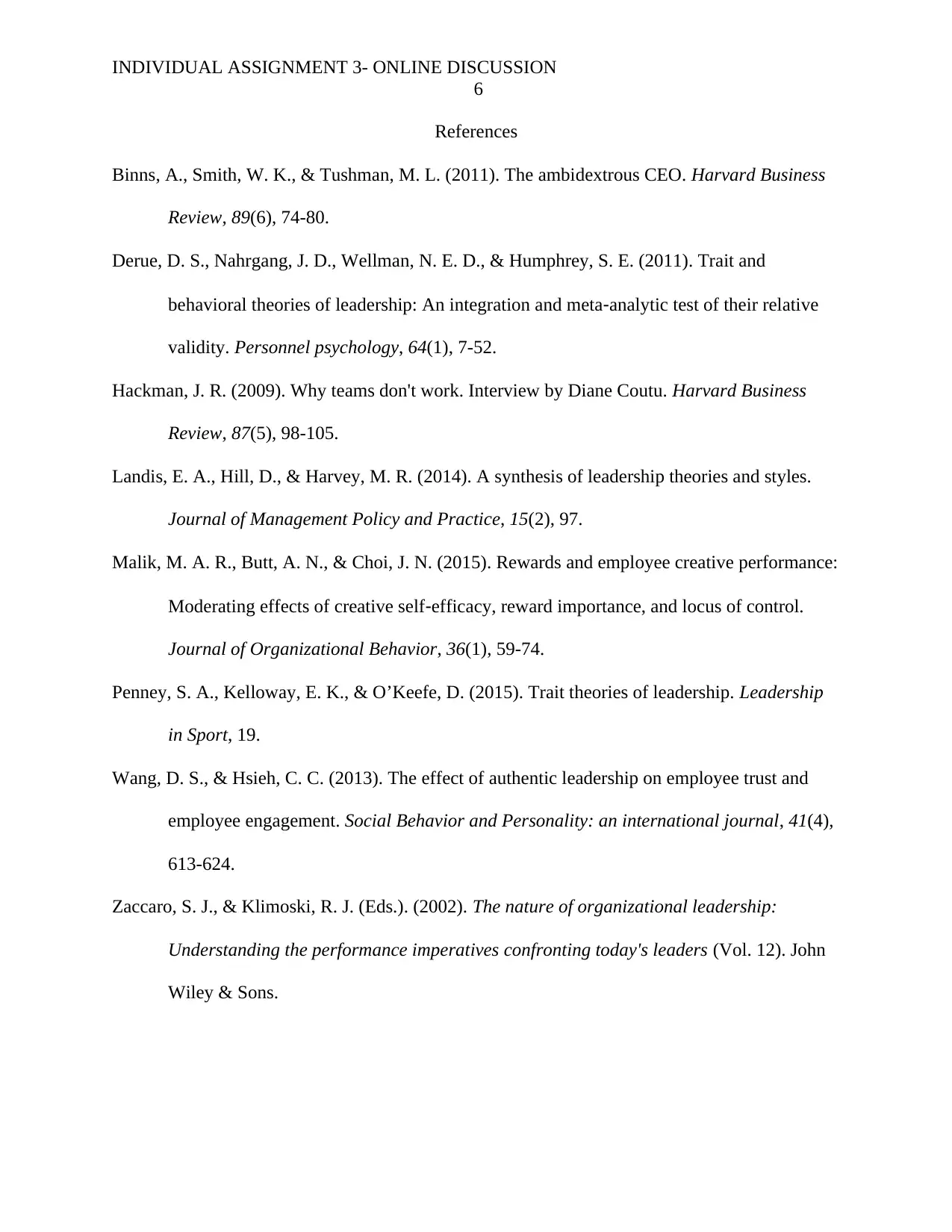
INDIVIDUAL ASSIGNMENT 3- ONLINE DISCUSSION
6
References
Binns, A., Smith, W. K., & Tushman, M. L. (2011). The ambidextrous CEO. Harvard Business
Review, 89(6), 74-80.
Derue, D. S., Nahrgang, J. D., Wellman, N. E. D., & Humphrey, S. E. (2011). Trait and
behavioral theories of leadership: An integration and meta‐analytic test of their relative
validity. Personnel psychology, 64(1), 7-52.
Hackman, J. R. (2009). Why teams don't work. Interview by Diane Coutu. Harvard Business
Review, 87(5), 98-105.
Landis, E. A., Hill, D., & Harvey, M. R. (2014). A synthesis of leadership theories and styles.
Journal of Management Policy and Practice, 15(2), 97.
Malik, M. A. R., Butt, A. N., & Choi, J. N. (2015). Rewards and employee creative performance:
Moderating effects of creative self‐efficacy, reward importance, and locus of control.
Journal of Organizational Behavior, 36(1), 59-74.
Penney, S. A., Kelloway, E. K., & O’Keefe, D. (2015). Trait theories of leadership. Leadership
in Sport, 19.
Wang, D. S., & Hsieh, C. C. (2013). The effect of authentic leadership on employee trust and
employee engagement. Social Behavior and Personality: an international journal, 41(4),
613-624.
Zaccaro, S. J., & Klimoski, R. J. (Eds.). (2002). The nature of organizational leadership:
Understanding the performance imperatives confronting today's leaders (Vol. 12). John
Wiley & Sons.
6
References
Binns, A., Smith, W. K., & Tushman, M. L. (2011). The ambidextrous CEO. Harvard Business
Review, 89(6), 74-80.
Derue, D. S., Nahrgang, J. D., Wellman, N. E. D., & Humphrey, S. E. (2011). Trait and
behavioral theories of leadership: An integration and meta‐analytic test of their relative
validity. Personnel psychology, 64(1), 7-52.
Hackman, J. R. (2009). Why teams don't work. Interview by Diane Coutu. Harvard Business
Review, 87(5), 98-105.
Landis, E. A., Hill, D., & Harvey, M. R. (2014). A synthesis of leadership theories and styles.
Journal of Management Policy and Practice, 15(2), 97.
Malik, M. A. R., Butt, A. N., & Choi, J. N. (2015). Rewards and employee creative performance:
Moderating effects of creative self‐efficacy, reward importance, and locus of control.
Journal of Organizational Behavior, 36(1), 59-74.
Penney, S. A., Kelloway, E. K., & O’Keefe, D. (2015). Trait theories of leadership. Leadership
in Sport, 19.
Wang, D. S., & Hsieh, C. C. (2013). The effect of authentic leadership on employee trust and
employee engagement. Social Behavior and Personality: an international journal, 41(4),
613-624.
Zaccaro, S. J., & Klimoski, R. J. (Eds.). (2002). The nature of organizational leadership:
Understanding the performance imperatives confronting today's leaders (Vol. 12). John
Wiley & Sons.
⊘ This is a preview!⊘
Do you want full access?
Subscribe today to unlock all pages.

Trusted by 1+ million students worldwide
1 out of 6
Related Documents
Your All-in-One AI-Powered Toolkit for Academic Success.
+13062052269
info@desklib.com
Available 24*7 on WhatsApp / Email
![[object Object]](/_next/static/media/star-bottom.7253800d.svg)
Unlock your academic potential
Copyright © 2020–2026 A2Z Services. All Rights Reserved. Developed and managed by ZUCOL.




